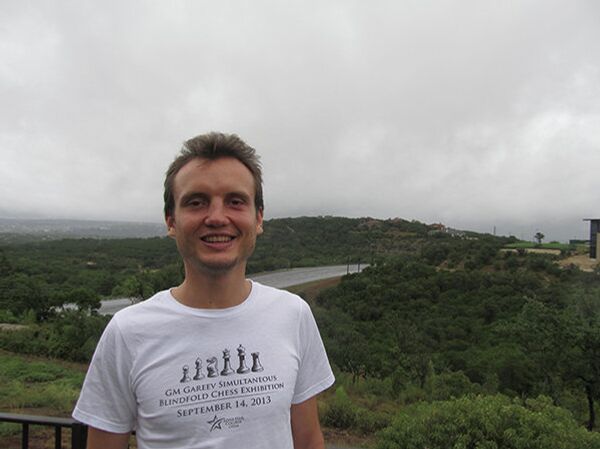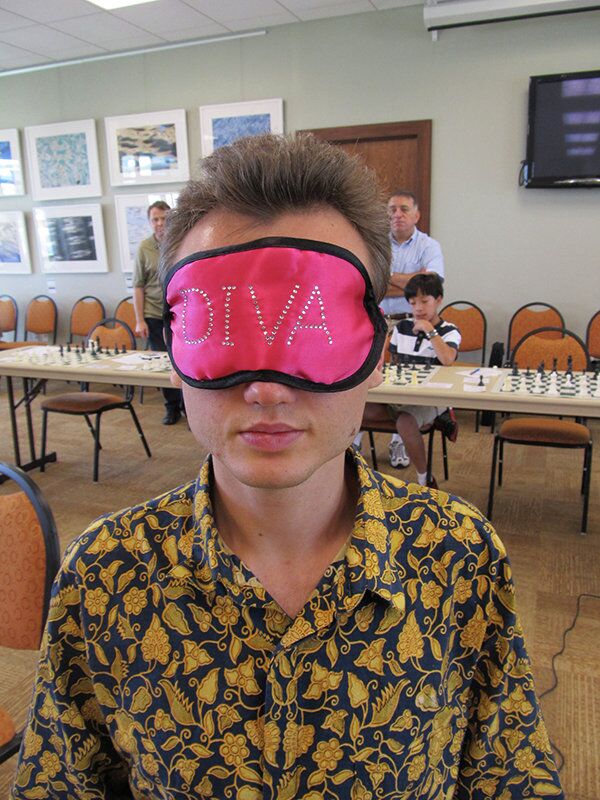AUSTIN, Texas, October 10 (by Daniel Kalder for RIA Novosti) – A motorbike-riding, parachute-jumping recent attendee at Nevada’s Burning Man festival who counts illusionists David Copperfield and Harry Houdini as his heroes, Timur Gareev admits he is not your typical chess grandmaster.
“I’d say I’m like an explorer,” the 25-year-old from the former Soviet Central Asian republic of Uzbekistan explained. “It’s like a novelty for the chess world. I’m not trying to be that way, I just am that way.”
Gareev, currently ranked Number 3 in the United States and 70th in the international FIDE rankings, was in Texas to practice for an upcoming world record attempt: Within the year, he intends to play 50 games of chess simultaneously while blindfolded. The current record, held by Mark Lang of Germany, is 46 games.
Talking in an interview earlier this month at the Austin library where he competed blindfold against multiple players a day later, the T-shirt-clad, languid Gareev explained his fascination with blindfold chess.
“In blindfold chess, the concept is pretty simple: You don’t see any of the boards, and you’re playing many, many games at the same time,” he said. It’s showmanship, you know. If you create the environment where you can convey that in a theatrical experience, it gets to be pretty fascinating.”
It is this native curiosity and passion for the theatrical as much as intellectual rigor – along with sleep, yoga, meditation and the grapes he munches throughout the interview – that color Gareev’s vision of the “game of kings” and place him at the intersection of performance and chess.
Copperfield, he said, has been particularly influential. “He created a whole new level of experience from these small tricks of juggling. Suddenly he’s flying, he’s hiding the Statue of Liberty, making airplanes disappear … he created this whole new experience out of it!”
Gareev said he is currently searching for a sponsor for his blindfold simultaneous chess world record attempt. And he says he is determined to bring a little physical showmanship to an ancient board game of the mind little known for its visual appeal.

“It will be more like a planetarium experience,” says Gareev of his planned record attempt. “Where you can come in and feel the environment and just get fascinated.”
Currently based in San Diego, Gareev was born to Tatar parents in Tashkent in 1988. He was four years old when his grandfather taught him how to play chess. His great-uncle, a Russian army general, was a renowned theoretician of war.
During his childhood, Gareev spent “hours and hours and hours working with my coach” the Soviet Grandmaster Georgy Borisenko. The effort paid off: He won his first major international competition aged 12, and qualified as the youngest grandmaster in the world three years later.
“At that very moment I guess I was the youngest but not the youngest in history by any means,” said Gareev, who is coolly confident but not boastful.
“Within a few years there were 13- and 12-year-old grandmasters. Now there is no great surprise when somebody becomes a grandmaster at 13 or 14.”
At 17, Gareev won a chess scholarship to the University of Texas at Brownsville. “It was always my dream to come to the United States. That certainly opened a world of opportunities for me.”
Gareev today plays regularly on the American competitive chess circuit; recent victories include the 2011 Chicago Open and the 2012 North American Open. But blindfold chess is his “main thing at this point.”
Gareev estimated that he has played over 1000 blindfold games in the year and a half he has spent traveling the United States staging exhibition matches. Even so, he said, “I’m not at my optimal level by far.”
How does he do it? Vague when pressed for details, Gareev insisted that “…memorization has nothing to do with it. It’s rather experiential, a visceral sense of pattern recognition.” The beginning stages of simultaneous blindfold matches are most difficult, he said. After that, the experience of playing so many games at once becomes “…like a form of meditation.”
Gareev began the Texas exhibition event surrounded by 26 players of varying ages, who were positioned behind chessboards at tables arranged in a rectangle. In trademark theatrical fashion, he played wearing a black-bordered, bright pink sleep mask with the word “DIVA” stitched in sequins across the front.
Challengers took turns calling out their moves and Gareev usually countered with his own move within a few seconds. More players were added throughout the day, until Gareev was playing 35 opponents simultaneously. Players and spectators alike sat in hushed concentration mixed with awe at the feat.
Eventually, after eight hours and 55 minutes, the exhibition drew to a close. Gareev won 23 of the games, lost two and drew 10.

